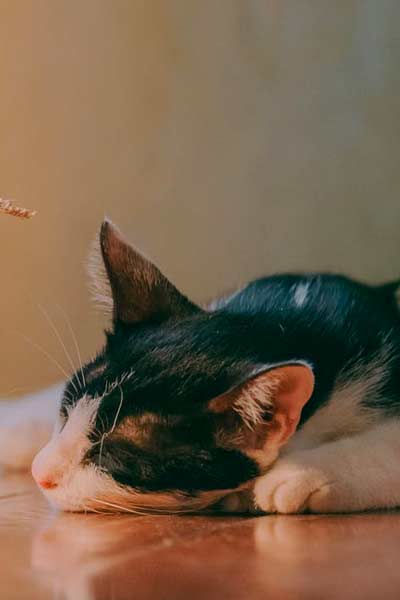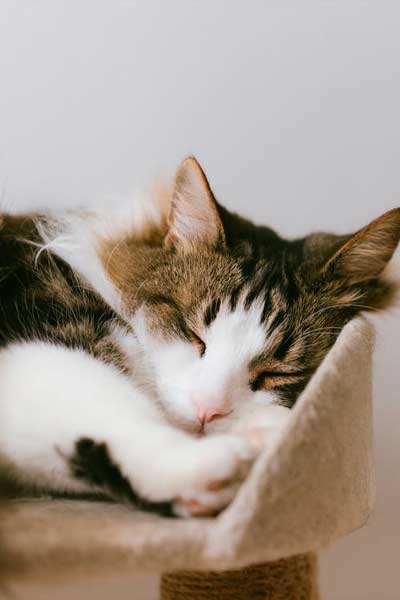As a cat parent, you might have thought of this question about your old cat’s behavior Why Do Cats Hide When They Are Dying? Cats are known for being independent, stoic animals that often hide their emotions.
So it may come as a surprise to many cat owners when their beloved feline companion begins to hide away and act lethargic in the days leading up to their death.
Why Do Cats Hide When They Are Dying? Cats hide when they die to protect themselves from predators, as is the case with most wild animals. Cats are predators themselves, and they may consider it too dangerous to be alive in their final moments.
Why Do Cats Hide When They Are Dying?
As cats age, they often experience more pain and chronic illness, which can lead to lethargy and listlessness. Sometimes it’s difficult to tell if these symptoms are due to old age or a more serious illness like cancer.
Or perhaps you have had the experience of your cat hiding under your bed during a thunderstorm. This could be because cats associate hiding with being hunted by their prey. That is why they hide when they are frightened or under attack.

Signs a cat is dying
It is very hard to lose a cat that is dying, but sometimes it happens. The signs are there, you just have to be aware of the symptoms. If your cat’s appetite changes or stops altogether.
This can be a sign of serious illness, especially if your cat already has a condition that may lead to loss of appetite. Also, pay attention to whether or not your senior cat is purring, as this can be a good indicator of whether or not your cat feels well.
A cat may hide, stop eating/drinking, and become lethargic before it dies. They often experience pain in their joints and muscles, so they will likely move around less than usual at the end of their lives.
Here are a few signs that your cat is dying:
- Eating less and drinking less: When your cat is dying, they may not feel like eating or drinking, even when they are hungry or thirsty. Be sure to increase the freshwater supply if your cat is not drinking much.
- Lethargic and weak: Your cat will become weaker as they are dying, so they won’t be able to do things like walk or climb the stairs.
- Loss of appetite: Your cat could lack an appetite for food or water if they are dying. You may see the loss of your cat’s appetite even though there was no sign that it had a health problem before this.
- Vomiting or diarrhea: This can be caused by a change in food, something they have eaten outside, or an illness. If your cat is vomiting more than usual it could be due to another problem.
- Mental confusion: A dying cat may start acting disoriented and confused. They will look around the room without knowing why they are doing it. They may not recognize their owners and will spend more time alone.
- Low body temperature: When cats are tired, they feel colder than usual. They might not be able to get warm because their body is shutting down.
- Fever: If your cat has a fever, it could indicate that they have an infection. There are many reasons for fevers in cats, but if you notice the symptoms of other signs before this sign show up, there may be something more serious going on.
- Decreased skin elasticity: Their skin will start to look dry and lose its elasticity. It could also take longer for your cat’s skin to return to its normal position after you press it.
Sometimes they stop purring also. A cat could become defensive when they are in pain or near death. They will act differently than usual, probably hiding because your presence is too confusing for them to tolerate.
But if this occurs regularly or regularly in the days leading up to their death, there may be something more serious going on.
Cats usually die in a place they feel comfortable. Many cats choose to die under the bed or somewhere where they have been sleeping a lot lately. Make sure your cat has been eating, drinking, and using the litter box before you assume that they are dying.

What to do when my cat is dying
You should never assume that your cat will pass away peacefully. You can’t know for sure how your pet’s death will happen, so you need to be ready for any possibility.
When you are preparing yourself for the worst, first remember to take care of yourself before anything else. If you are not emotionally and mentally well, you will not be able to take care of your cat in their last days.
If something is seriously wrong with your pet, you should take them to the vet right away. If they are in pain or unable to stand up for themselves, it’s always best if they see a professional before passing away.
Don’t lose your head when it comes to giving them timely medical care. It’s important that you remain calm in order to be able to take care of your pet properly, so stay rational and don’t panic.
When the time comes, remember what your cat means to you and allow yourself to grieve naturally. Do not feel ashamed if you cry in front of your cat, as it will not scare them or hurt them.
It’s perfectly normal to be sad when you lose a pet after having had them for so long. Don’t act like this sadness is wrong because you are the only one who is allowed to feel this way toward your pets.
Senior cats can live with their owners for their whole lives, so when they finally pass away, it is important to accept what has happened. Ultimately, your cat died after living a full life with you and will help you in the grieving process if you know how to listen.
Do cats prefer to die alone?
It is their instinct that tells them to hide and stay away from others while they are dying. The familiarity of their bedroom or another room in the house can make it easier for them to cope with this natural process.
Is it OK to cry when my cat is dying?
Yes, you should allow yourself to grieve. Remember, this is a time for you and your pet and no one else. Do not be ashamed or embarrassed if tears come down your cheeks because that’s what you feel at the moment.
How long do cats take to die?
It is hard to say when they will pass away because it can be different for each cat. It depends on how much time is left and how quickly they react to their illness. This usually varies from cat to cat, so it’s difficult to pinpoint an exact time.
It also depends if they were put under medical treatment. Some cats pass away shortly after they have been put out of their misery, while others may stay alive for one or two days more before finally passing away. In any case, do not rush them when they pass away because they need their rest.
What is the best way to say goodbye to my cat?
Be there for your pet in their last moments, don’t leave them alone, and never let them go through this experience alone. This could be very traumatic for you as well due to the emotional connection between you and your pet.
When the end comes, try to stay as rational as possible because this could be hard for you or your cat if emotions come into play too much. You will need to make sure that your pet is not in pain and that they are looking comfortable before letting them pass away. Stay with them until the last moment so you can have a final moment together.
Final Words:
This blog post answers the question Why Do Cats Hide When They Are Dying? It’s important to take care of yourself before taking care of your pet if you know that something serious is wrong with them, but don’t panic or lose your head in the process of giving them medical attention.
When it comes time for their final moments, make sure that they are comfortable and not in any pain before letting them pass away peacefully. Finally, stay with your cat until the very end so you can have a final moment together as well.



